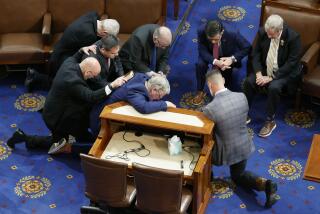Methodist Clergy Found More Liberal Than Average Churchgoer
- Share via
United Methodist clergy are more liberal than United Methodists in the pews, and delegates to the church’s major policy-making body are more liberal than the average United Methodist, according to a study conducted by the church’s General Council on Ministries.
The study appears to support claims frequently made by critics that the leadership of the 8.9-million-member denomination is more liberal than the grass-roots membership.
Based on a series of 45 questions asked of clergy and lay persons, including both delegates and nondelegates to the church’s 1988 General Conference, the study concludes that “clergy were consistently more liberal than lay respondents” and that “nondelegates were consistently more conservative than General Conference delegates.”
The questions, formulated around major issues facing the 1988 General Conference, were posed in mail and telephone surveys conducted in February and March 1988--just weeks before the General Conference, held in St. Louis.
The Rev. Mearle Griffith, research chief of the General Council on Ministries, observed, “For the first time, we have tabulated the differences of opinion between a panel of local church respondents and elected delegates. We have heard for years that the local church appeared to be more conservative. This gives the denomination for the first time a chance to compare hunches with valid data.”
Most indicative of a respondent’s stand on a wide range of issues--more so than demographic variables or institutional status--was the question asking whether the Bible is “the literal word of God.”
“This one belief seemed to structure the entire set of survey responses,” according to the General Council on Ministries analysis. That question also revealed the widest divergence, among all the questions, between United Methodist clergy and lay persons.
While just 11% of the clergy delegates to the General Conference agreed that the Bible is “the literal word of God,” 26% of the lay delegates voiced agreement. Among nondelegates, 25% of the clergy responded in the affirmative, while 62% of lay persons agreed that the Bible is “the literal word of God.”
The survey analysis concludes, “Individual opinions about biblical interpretation may be strong sources of potential conflicts and misunderstandings among lay nondelegates and clergy or lay delegates in comprehending the significance of General Conference actions.”
In terms of broad issue areas, the subject showing the greatest statistical variance among different clergy and lay persons, delegates and nondelegates, was a revision of the hymnal, which was approved by an overwhelming majority of General Conference delegates.
Respondents were widely divided on the statement, for example, “The new hymnal should include hymns from different traditions, including Asian, Hispanic, Native American/Indian and black.”
The area that showed the greatest amount of agreement was the issue of homosexuality, one of the most hotly debated topics in the denomination in recent years. Of all 45 statements listed, “homosexuality is incompatible with Christian teaching”--reflecting the official church position on homosexuality--showed a higher degree of unanimity than any of ther others except for the idea that “a clear statement of common beliefs would help to unify the church.”
More to Read
Sign up for Essential California
The most important California stories and recommendations in your inbox every morning.
You may occasionally receive promotional content from the Los Angeles Times.










